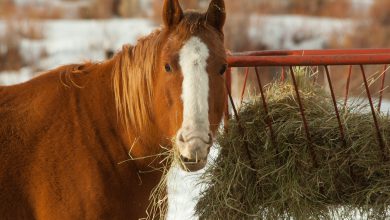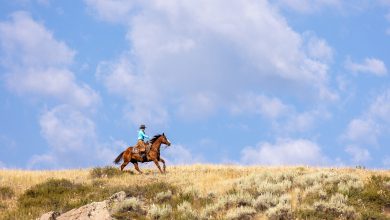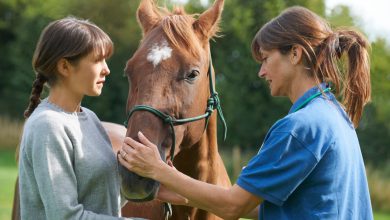Horse Boarding Guide: Types, Costs & FAQs
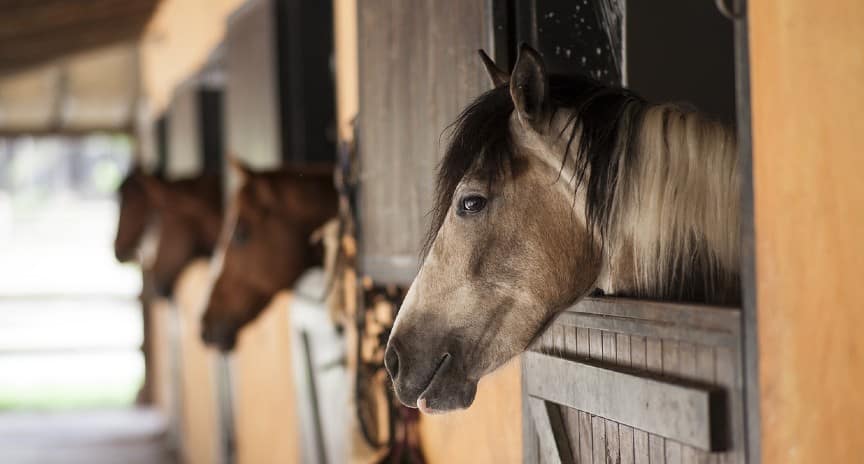
This post may contain affiliate links. We earn from qualifying purchases. Learn More
The time has finally come that you can afford to buy your own horse. Great! However, owning a horse comes with endless responsibilities and it shouldn’t be a rash decision.
When announcing your plans to family and friends, you might hear “But where is the horse is going to live?” This is something you should consider carefully and weigh all the pros and cons before making a decision.
Unless you are fortunate enough to have your own land, a boarding facility might be your best option. Boarding facilities usually charge a monthly fee for housing your horse at their property.
The cost of boarding a horse can vary depending on the location, the type of boarding you choose, the facilities available, and the services offered.
Keep in mind that a horse’s upkeep will always cost more than its initial price. However, with thorough planning, it is possible to stay within your budget. In this guide, we give you some tips and pointers about choosing a horse boarding plan that’s right for you!
The Costs Of Boarding A Horse
There are many aspects that affect the costs of boarding a horse and you should consider each of them carefully. Write a list of your wants and needs regarding your ideal facility and think about where you can cut down on costs.
Location
The location of a boarding stable will dramatically affect the price you can expect to pay. A facility that is closer to a city will be far more expensive than one located in a rural area.
You should also consider how far you are willing to drive from home, as the cost of gas will add to your monthly outgoings. Also, if you are planning to compete with your horse, you will want your ideal barn to be somewhere close to competition centers.
Facilities
Another factor that will determine your horse’s monthly board is the types of facilities available. The basic facilities most boarding stables have are:
- Stalls
- Turnout
- Outdoor riding arena
- Show jumps
- Tack room
- Feed room
- Horse washing area
- Trails
- Parking space for trailer
Some stables might also have:
- Indoor riding arena
- Round pen
- Horse walker
- Horse solarium
- On-site trainer/instructor
Generally, the fewer facilities are available, the cheaper your horse’s board will be. Look for a stable that suits your interests, budget, and needs. For example, if you want to do showjumping with your horse, then you need a riding arena with a set of show jumps.
Services
The services provided depend on the type of board you choose and are reflected in the price. For example, a full board covers your horse’s basic care and maintenance, which will come at an extra cost on top of your regular monthly fees. In the next section, we outline the most common type of boards available to horse owners.
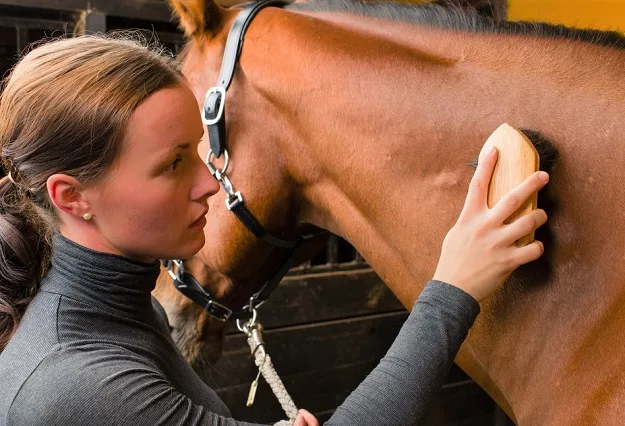
Some barns also offer the option of having lessons or training services included in the monthly bill. This can range from an additional $150-$400 monthly cost. Everything that’s included in your horse’s board should be outlined in a contract.
Types of Horse Boarding
There are many boarding options available and the type you choose will depend on your budget and needs. While some stables specialize in a particular type of board, others have multiple options available. Knowing what you want and the facilities you need will help you decide which one is right for you and your horse.
Full Board
A full board is where the barn staff takes care of all the daily chores like mucking out, feeding, watering, turnout, and blanketing when necessary. You’re horse’s feed, bedding and hay will also be provided.
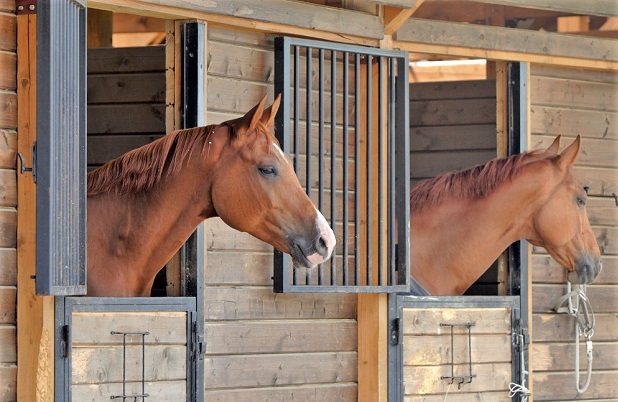
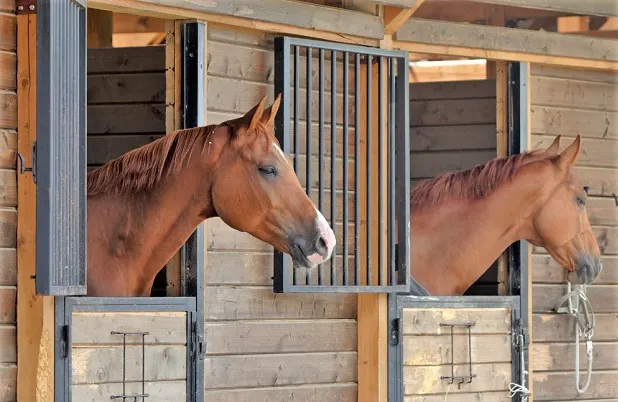
This type of board often includes the routine scheduling of farrier and vet visits, as well as the use of facilities like riding arenas, trails, and a tack room. Some boarding stables also include exercising, training, or lessons in the price or at an extra fee.
The average cost of full boarding generally ranges from $300 to $700 per month. However, it can be much higher depending on the location. In some urban areas, full boarding a horse can cost as much as $2000 to $3000.
While the price might seem staggering at first, this boarding option is perfect for owners with busy schedules who are unable to visit their horses daily.
Part Board
Whether we like it or not, owning a horse is an expensive hobby. If you’re a little tight on the budget, part boarding might be your ideal option. In many cases, a part board will only cost half the price of a full board.
The part boarding arrangements for your horse will differ from barn to barn. Some facilities might look after your horse in the mornings, while you are responsible for the evening chores.
Other options include allowing someone else to ride your horse let’s say three times a week. This can either be a sharer or someone who rides your horse on lessons or trail rides. You must have a written contract that outlines the details of such an arrangement.
Self-Care/D.I.Y. Board
If you are on a budget and have the time, then self-care boarding is your best option. When choosing this type of board, you’ll still have access to all the barn’s facilities. However, you will also be responsible for the daily care of your horse and must do all the mucking out, feeding, turnout, and blanketing.
The average monthly cost of a self-care board is between $100 to $200. Keep in mind that you must arrange for feed, bedding and hay yourself and be there for the vet and farrier visits.
Self-care boarding is a big commitment as it involves traveling to your horse once or twice a day. While it is certainly more work, you also get to spend more time with your horse and build up a bond with them.
The biggest challenge of a self-care board is arranging for cover when you are unable to visit your horse. In these situations, having a good relationship with other boarders can be a lifesaver. Offering to help out others at a barn is always a good idea as you will likely need help too at some point in the future.
Here’s a good video explaining pros and cons of full and self-boarding your horse:
Pasture Board
Pasture boarding is where you pay for your horse to live out all year round. It is often the cheapest type of board and offers many benefits of a full board at a fraction of the price. The average monthly fees for pasture boarding your horse range between $100 to $400.
A pasture boarding facility will provide your horse with feed, water, and a run-in shelter. Staff on the premises will also look after your horse’s daily needs, checking for injuries and signs of ill health.
Naturally, there are many advantages to pasture boarding. For once, your horse is continuously moving, which is good for their circulation and digestive system. Horses on pasture board also have the freedom to express their natural behaviors, including socializing with other horses.

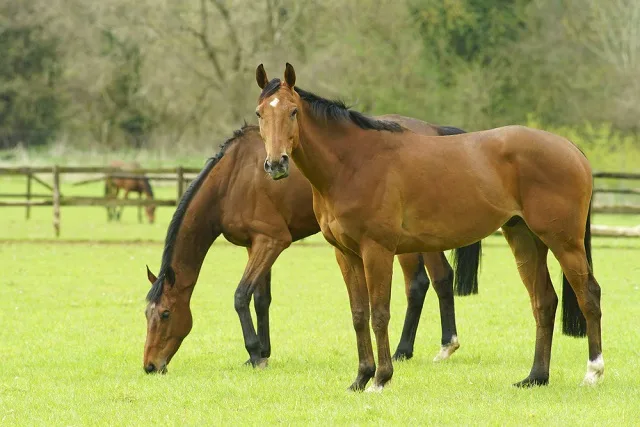
Living on a pasture full-time is not only natural for horses, but also prevents boredom. As we mention in our best stall toys for horses guide, horses that spend long hours in the stable will likely require enrichments in their environment.
Pasture boarding is a great budget-friendly option and ideal for owners who cannot ride every day. However, your horse must be fit and healthy to cope with the elements, and careful monitoring of their condition is advised.
Retirement Board
Retirement facilities for horses have become increasingly popular in recent years. These places specialize in caring for senior horses or horses that have suffered permanent loss of use due to an injury or disease.
This type of board is a great choice for owners who want to ensure their retired horses receive the best possible care. The costs are usually in the range of $300-$600 as all your horse’s needs are taken care of.
A retirement barn offers a range of facilities and services specialized for older horses. Your horse will have access to plenty of grazing in the company of other horses. The staff will arrange veterinary and farrier visits and take care of feeding, supplementing, worming, and administering medications to your horse.
Basically, a retirement board offers the benefits of a full board with additional specialized services for senior horses. What’s more, staff will often handle the euthanasia of your horse and arrange for a burial or cremation.
Knowing that your beloved horse will be in knowledgable hands when the time comes is a major advantage of retirement boards.
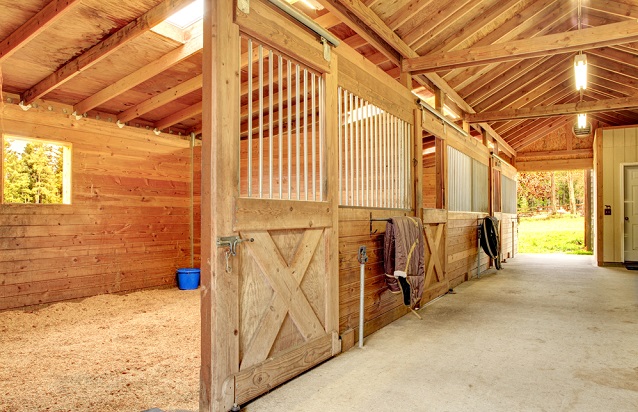
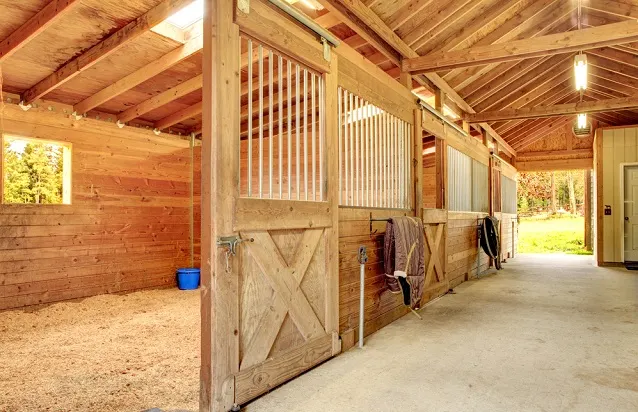
Training Board
Training boards are ideal for owners whose horses require further training, but don’t have the experience to do it themselves. These facilities usually have several professional trainers on-site. Some trainers might be specialized in starting young horses under saddle, while others in working with problem horses or a particular discipline.
This type of board is typically the most expensive, as your horse will be on full board and have regular training sessions. Prices usually start at $600/month and can go up to $2,500/month. As you might expect, trainers with more experience and a good reputation will charge more.
So why should you choose to keep your horse at a training facility instead of calling a trainer out to your current barn? As a matter of fact, paying for a training board will work out cheaper in the long run. Trainers will either charge you $40 to $75 per hour or a monthly fee of around $650 on top of your basic costs.
Before committing to send your horse to a training facility, keep in mind that many places have minimum stay requirements. While trainers can give you a rough estimate, the final length of a horse’s stay will vary between individuals.
Choosing The Right Facility
When choosing a boarding facility for your horse, weigh all of your options carefully. Consider the maximum distance you are willing to travel, what your budget is and how much time you could spend with your horse.
Ultimately, these are the main factors that will influence which stable and type of board you will choose.

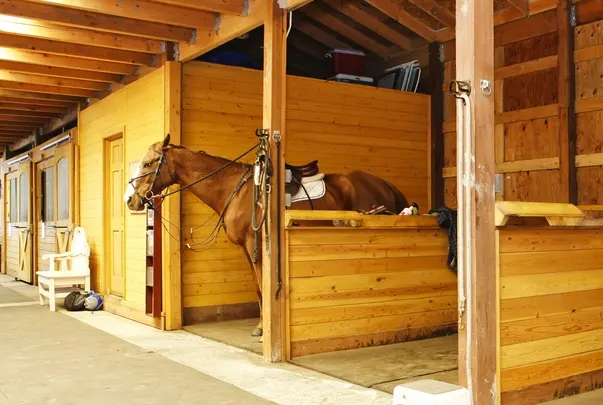
Once you have decided on the basics, look up and research boarding facilities in your area. Determine which places suit your needs and schedule a visit to each one. It’s a good idea to write a list of questions you want to ask the owner and staff.
The boarders can also give you valuable insights into the operation of the facility. Consulting them can warn you about any red flags and help you make the right decision.
You might also want to ask around online, such as in forums or Facebook groups.
Frequently Asked Questions
Optional extras when keeping your horse at a full board include grooming, clipping, mane pulling, exercising, training, lessons, and parking space for a horse trailer. You must also pay extra for any supplements your horse might need.
Depending on the type of facility, some of these extras might already be included in your horse’s board. Always read the boarding agreement carefully and consult the manager about any questions you might have.
What details are in a horse boarding agreement?
A boarding agreement is a legal contract you sign when committing to a boarding facility. It should clearly outline what’s included in your horse’s board and the rules you must follow while staying at the barn.
A horse boarding agreement should include the details of the owner and horse, required vaccinations, services provided, boarding fees and the due date, notice period, liability, and the terms and conditions.
Make sure you fully understand the terms of the boarding agreement before signing. If you then fail to honor the contract, the facility owner or manager might ask you to look for another barn.

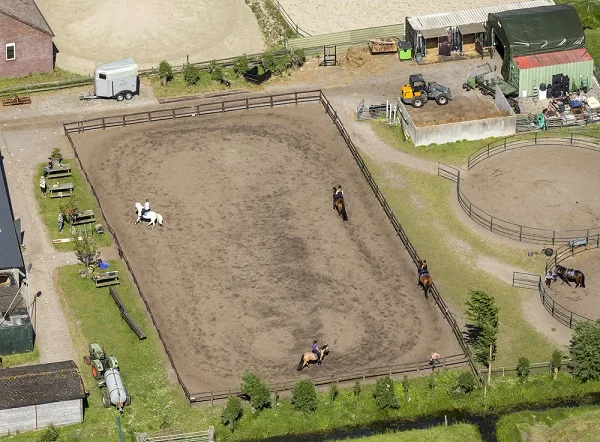
What additional costs must I pay for my horse?
Other than the boarding fee, additional costs of owning a horse are paying for vet and farrier visits. The vet should come out at least once a year to examine your horse’s health and administer vaccinations. You should also schedule farrier visits every 6-8 weeks as your horse will require trimming or shoeing.
Horses are unpredictable animals and unexpected incidents can happen any time. Hence why it’s important to have money put aside for emergencies, should your horse require urgent veterinary treatment. To avoid financial struggles, you should always insure your horse.
How much does it cost to board a horse overnight?
Boarding a horse overnight at a show or event will cost more per night than your regular board. Prices vary greatly depending on the event, however, you can expect to pay $30-$50 per horse.
With that being said, boarding at high-profile events will cost significantly more. When boarding overnight, you will have access to a stable, bedding, hay, tack room and parking space for your trailer.
How do you keep a horse cheap?
While owning a horse will always be an expensive venture, there are ways to cut down on the costs.
You can keep a horse cheap by choosing a self-care or pasture board. Loaning your horse out a few days a week will also help with the costs. Some boarding facilities might be open to reducing your rate in return for doing chores.
You can also save money by only buying the minimum amount of tack and equipment you need. There’s no need to buy saddle pads in every color or treat your horse to expensive snacks every week. Apples and carrots will do just fine.
In the winter, many owners tend to go overboard with blanketing. This can quickly get expensive, and before you know it, you’ll have a blanket for every weather condition. Remember that horses with a full winter coat are comfortable living at 18°F (-7°C) and can tolerate much lower temperatures.
While there are definite ways to keep a horse cheap, you shouldn’t cut corners. Never save money on insurance, vet and farrier visits, or any other costs relating to your horse’s health.

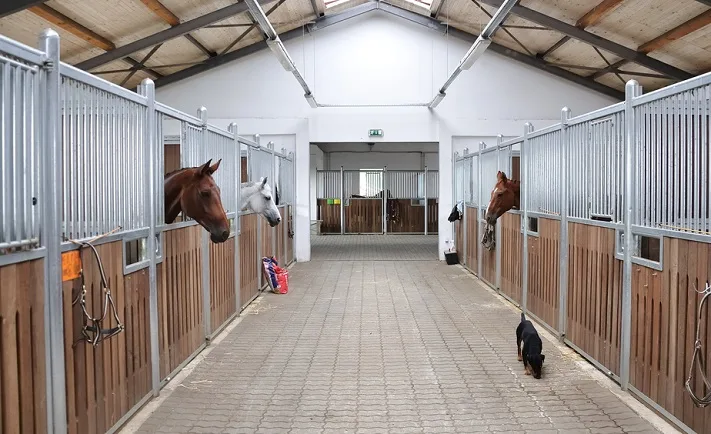
What should I look for when boarding a horse?
Things you should look for when boarding a horse include: happy and healthy horses, clean stalls with plenty of room, good quality feed and hay, well-maintained paddocks, and a good atmosphere.
When searching for a boarding facility, don’t be in a rush and don’t settle for less. If you do your research, you will find an option to suit your budget. Make sure the stable meets the needs of both you and your horse in terms of services and facilities.
Also, read our guide to horse transport for top tips on transporting your horse to their boarding facility.
Is it cheaper to board a horse or keep it?
Both boarding a horse and keeping it at home have their pros and cons. When keeping a horse at home, you have the advantage of controlling every aspect of their daily lives. However, it will be more difficult to plan holidays.
Whether it’s cheap to board a horse or keep it at home depends on your situation. Boarding a horse is definitely cheaper if you don’t have your own land and facilities. However, if you have enough grazing on your property, you can keep the costs of a horse to a minimum.
Nevertheless, boarding a horse might still come out cheaper as you don’t have to spend on maintaining your fields and facilities. It might also be expensive to find someone knowledgeable to look after your horse while you’re away, unless you have a friend or family member you can trust.
What’s more, boarding stables tend to buy hay and bedding in bulk and split the cost between boarders. Some will even have their own hayfields, which provides an added advantage in terms of cost. It’s also common that boarders arrange to have the vet or farrier out on the same day, reducing the call-out fee per person.
Is boarding a horse worth it?
For most first-time horse owners, boarding a horse is definitely worth it. You will not only have access to various facilities and services, but also the advice of more experienced owners.
Consulting other boarders or staff before you call the vet will often save you money on vet bills. It’s likely your fellow horse owners have seen the problem you’re facing before and know the best course of action.
